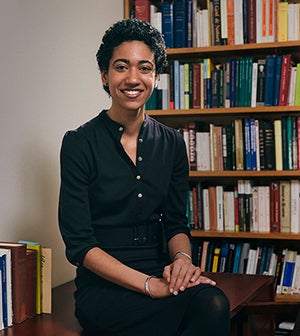 What does it mean to be oppressed? Does it affect how we use and see our bodies? Can eye contact, a nod, or a smile have a large-scale impact on social change? These are some of the big questions that Céline Leboeuf ’07 is asking.
What does it mean to be oppressed? Does it affect how we use and see our bodies? Can eye contact, a nod, or a smile have a large-scale impact on social change? These are some of the big questions that Céline Leboeuf ’07 is asking.
Leboeuf has long been fascinated by differences in race and gender. “I like to think broadly about what it means to be a human being,” says the PhD student in philosophy. Her research examines how certain body language and behaviors perpetuate prejudice and racism.
“Bodily alienation is a distorted relationship, a sense of distancing from one’s own body or over-identifying with a particular body part,” she explains. “Take a look at pop culture’s fascination with the thigh gap. This body image leads to a raw anxiety and a sense of distortion.”
So how do we challenge these distortions? “It starts and ends with the body,” Leboeuf says, arguing that we can start small—use our breath to relax, extend a friendly hand, or use a direct gaze to improve relations between the oppressed and non-oppressed.
Leboeuf identifies these changes in day-to-day interactions as acts of embodied resistance that can challenge oppressive climates. “I like to think of these positive gestures as micro-activism,” she says.
While Leboeuf has long been interested in sociological issues—she remembers being fascinated as a teenager by Simone de Beauvoir’s The Second Sex—she arrived as an undergraduate at Harvard College with plans to be a scientist.
A philosophy of science class she took during her freshman year made her think twice. Later, as a philosophy concentrator, she had the chance to work one-on-one with her philosophy advisor and realized what a dream it would be to study with all of the department’s faculty.
At that point, coming to the Graduate School of Arts and Sciences to study philosophy was an easy choice. “I really liked the philosophy department’s focus on ethics in our society,” she says. In addition to working closely with faculty members, Leboeuf has relished the chance to share her work with undergraduates in the classroom.
“As a teacher, I can help bridge the gap between faculty and undergraduates and share my experiences in the College and at the GSAS with them,” says Leboeuf, who was a recent Harvard Horizons scholar. “I love the back-and-forth dialogue with my students, and I can see it influencing my own work.”
Leboeuf hopes to have a future in academia, continuing to teach and conduct research.
“I really like the scope of philosophy. It is a lens we can use to reflect on pop culture, personality, and friendships,” she says. “I want to contribute to the kinds of transformations that encourage people to be reflective in their own lives and possibly change their lives.”